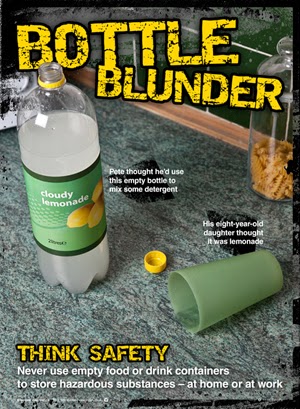1.
2.
3.
Exposure to chemicals can have devastating consequences
This story shows how corrosive dishwasher fluid, which should have been safely locked away, was mistaken for orange juice. The incident led to one death and agonising injuries for five other individuals.
Cancer Research UK reports that occupational exposure to cancer-causing chemicals is responsible for around 4% of cancer cases in the the UK.
The HSE reports that in 2012 there were an estimated 179 new cases of occupational asthma, mainly caused by exposure to hazardous substances.
Chemical labelling is vital to employee safety
Chemicals are an essential part of daily life, both at work and at home, and need to be handled with care.
If your employees use, transport, manufacture or dispose of chemicals, they could be at risk. A clear label helps them to easily determine what the chemical is and what the risks are when handling it.
Risks of mishandling chemicals include:
Risks of mishandling chemicals include:
- Fire
- Explosion
- Poisoning
- Radiation
- Dermatitis
- Chemicals burns
- Asthma/respiratory problems
- Blindness
- Cancer
- Damage to the environment
Handling chemicals correctly can help to prevent accidents, injuries and disease
When handling chemicals, employees should:
- Ensure they are trained and authorised to do so
- Always check the label, so they know what chemical they are dealing with
- Report items with missing or unclear labels
- Refer to the risk assessment or Safety Data Sheet for further guidance
- Wear appropriate Personal Protective Equipment (PPE)
- Handle the chemical in a safe/designated area with suitable ventilation
- Take steps to protect those working around them
- Take care to avoid spills
- Dispose of chemicals correctly, according to guidelines
When storing chemicals, employees should:
- Report items with missing or unclear labels
- Store chemicals correctly in the designated area
- Keep chemicals in their original containers, wherever possible
- Never use empty food or drink containers to store chemicals
- Label alternative containers correctly, for example if the original container is damaged and needs to be replaced
Kodiak's posters regularly deal with issues relating to chemicals, including safe labelling, handling, storage and disposal.
If you would like to find out more about how our posters could help you improve chemical handling, please call us on 01530 456 000.




No comments:
Post a Comment